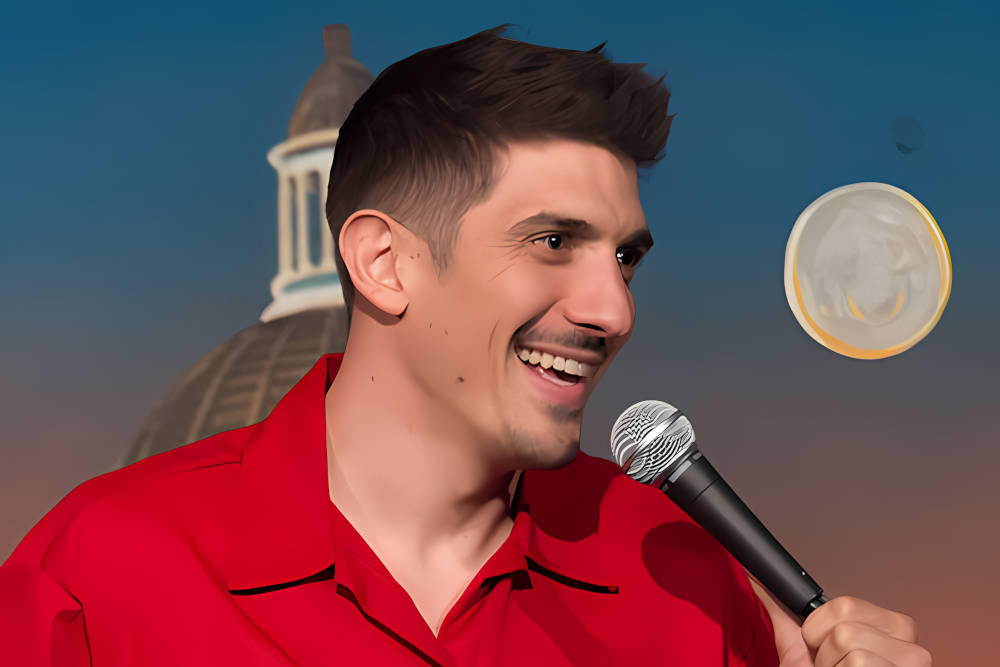
Seit dem Wiederaufflammen des Krieges zwischen Israel und der Hamas im Oktober 2023 kochen die Emotionen hoch. Proteste füllen die Universitäten, soziale Medien verwandeln sich in ein Schlachtfeld und selbst Comedy wird zum politischen Thema.
Was mit ein paar viralen Witzen über die Proteste im Gazastreifen begann, hat sich zu einem weltweiten Sturm entwickelt. Komiker wie Andrew Schulz, Shahar Cohen und Noa Tishby werden dafür gelobt, „die Wahrheit zu sagen“ – und dafür kritisiert, „die Unterdrückten zu verspotten“.
In der heutigen polarisierten Kultur ist jede Pointe politisch . Und die Frage lautet nicht mehr : „Ist es lustig?“, sondern : „Auf wessen Seite stehst du?“
👉 Sehen Sie sich hier die virale Zusammenstellung an:
Panaprium ist unabhängig und wird vom Leser unterstützt. Wenn Sie über unseren Link etwas kaufen, erhalten wir möglicherweise eine Provision. Wenn Sie können, unterstützen Sie uns bitte monatlich. Die Einrichtung dauert weniger als eine Minute und Sie werden jeden Monat einen großen Beitrag leisten. Danke schön!
Der Aufstieg der Anti-Protest-Satire
Es begann Ende 2023 mit Israels erfolgreicher Sketch-Show Eretz Nehederet („Ein wunderbares Land“). Ihr viraler Beitrag „Columbia Untisemity News“ verspottete amerikanische Studentenprotestierende als naiv, privilegiert und ahnungslos gegenüber dem Nahen Osten.
Eine Figur verkündet stolz, dass ihr College „LGBTQH“ willkommen heißt – „das H für Hamas, weil es gerade im Trend liegt.“ Der Sketch erreichte über 17 Millionen Aufrufe und spaltete das Publikum zwischen Gelächter und Empörung.
Bald schlossen sich Comedy-Sendungen und Podcasts auf der ganzen Welt diesem Trend an und verrissen Protestschilder, Sprechchöre und den „Aktivismus“ in den sozialen Medien. Für manche war es ein erfrischender Gegenschlag gegen die Heuchelei der Woke-Bewegung. Für andere war es grausam und entmenschlichend.
Andrew Schulz: Der Provokateur
Nur wenige Komiker bewegen sich so mutig und brutal wie Andrew Schulz . In seinem Podcast „Flagrant “ verspottete Schulz Demonstranten als „selbshassende Juden“ und scherzte, die Menschen in Gaza würden sich „nicht um diese Campus-Proteste kümmern“.
Die Gegenreaktion kam schnell – Reddit-Threads warfen ihm Rassismus und „zionistisches Mobbing“ vor. Doch Schulz ließ nicht locker:
„Komödien sollen Unbehagen auslösen“, sagte er. „Dort verbirgt sich die Wahrheit.“
Sein unverblümter Ton machte ihn für die Anhänger der Meinungsfreiheit zum Helden – und für progressive Kritiker zum Bösewicht. Schulz' Gaza-Witze zählen heute zu seinen umstrittensten, aber auch zu seinen meistgesehenen.
Von Israel ins Internet: Satire wird global
Was in Tel Aviv begann, verbreitete sich schnell im Internet. Clips von Eretz Nehederet und amerikanischen Komikern überschwemmten YouTube, Rumble und TikTok.
-
Ryan Long machte sich über Hollywood-Stars lustig, die nicht wussten, „über welche Seite sie posten sollten“.
-
Shahar Cohen machte Witze über die Doppelmoral des Westens gegenüber Israel.
-
Noa Tishby , halb Komikerin und halb Aktivistin, machte sich einen Namen, als sie US-Demonstranten interviewte, die nicht wussten, dass die Hamas den Gazastreifen regiert.
Diese Sketche vermischen Comedy, Politik und Aktivismus – manchmal brillant, manchmal rücksichtslos.
Die Gegenreaktion
Nicht jeder fand das lustig. Kritiker bezeichneten den Trend als „Schlag gegen traumatisierte Menschen“. Online-Aktivisten warfen Komikern vor, Leid in Inhalte zu verwandeln.
In Tweets und Schlagzeilen wurde alles Mögliche von „Propaganda“ bis „Hassrede“ genannt. Andere, vor allem in den USA und Israel, verteidigten die Verhöhnungen, da die Satire ihren Zweck erfüllte – nämlich Absurdität und Doppelmoral aufzudecken.
Ein israelischer Produzent sagte:
„Mit Comedy können wir Ängste überwinden. Man kann Lachen nicht verbieten, nur weil es unangenehm ist.“
Meinungsfreiheit vs. Sensibilität
Die Gaza-Roasts haben eine tiefere Frage neu entfacht:
Kann eine Komödie in einer Zeit, in der alles jemanden beleidigt, noch harte Wahrheiten erzählen?
-
Unterstützer sagen, Humor sei freie Meinungsäußerung – ein wichtiger Weg, um dem Mob-Denken entgegenzutreten.
-
Kritiker argumentieren, dass Komiker mit großer Bühne bei echtem menschlichen Leid Zurückhaltung üben sollten.
Doch die Spaltung offenbart mehr als nur den Geschmack in Sachen Witze – sie zeigt, wie tief die Kultur gespalten ist. Was die eine Gruppe als Mut betrachtet, empfindet die andere als Grausamkeit .
Ein Spiegel der Zeit
Ob man dem zustimmt oder nicht, diese Kritiken spiegeln die Haltung der Gesellschaft wider. Die Komödie ist zu einem Spiegel geworden – sie zeigt, wie gespalten wir sind, wie emotional die Politik geworden ist und wie die Wahrheit selbst nun zur Debatte steht.
Die Proteste in Gaza beweisen eines:
Lachen regt die Menschen immer noch zum Nachdenken an.
Es hängt einfach davon ab , woran sie denken.
Abschluss
Während die Proteste nachlassen, die Empörung im Internet jedoch anhält, stehen Komiker vor einer Entscheidung: Schweigen oder weiterhin Grenzen überschreiten.
Und während die Grenzen zwischen Humor, Politik und Aktivismus verschwimmen, bleibt eine Wahrheit bestehen:
Komödie kann vereinen oder trennen, heilen oder verletzen – aber sie bringt immer zum Vorschein, was wir uns nicht trauen, laut auszusprechen.
👉 Sehen Sie sich hier die virale Zusammenstellung an:
War dieser Artikel hilfreich für Sie? Bitte teilen Sie uns in den Kommentaren unten mit, was Ihnen gefallen oder nicht gefallen hat.
Haftungsausschluss: Die oben genannten Inhalte spiegeln nicht unbedingt die Meinung von Panaprium wider. Panaprium übernimmt keine Garantie, Bürgschaft oder Billigung der oben genannten Inhalte und ist in keiner Weise dafür verantwortlich. Alle hier geäußerten Meinungen basieren auf persönlichen Erfahrungen und sollten nicht als Billigung oder Garantie bestimmter Ergebnisse angesehen werden. Politische Kommentare sollten aufgrund der subjektiven Natur der Politik kritisch betrachtet werden.
About the Author: Alex Assoune
Wogegen Wir Kämpfen
Weltweit-Konzerne produzieren in den ärmsten Ländern im Übermaß billige Produkte.
Fabriken mit Sweatshop-ähnlichen Bedingungen, die die Arbeiter unterbezahlt.
Medienkonglomerate, die unethische, nicht nachhaltige Produkte bewerben.
Schlechte Akteure fördern durch unbewusstes Verhalten den übermäßigen Konsum.
- - - -
Zum Glück haben wir unsere Unterstützer, darunter auch Sie.
Panaprium wird von Lesern wie Ihnen finanziert, die sich unserer Mission anschließen möchten, die Welt völlig umweltfreundlich zu gestalten.
Wenn Sie können, unterstützen Sie uns bitte monatlich. Die Einrichtung dauert weniger als eine Minute und Sie werden jeden Monat einen großen Beitrag leisten. Danke schön.





































0 Kommentare